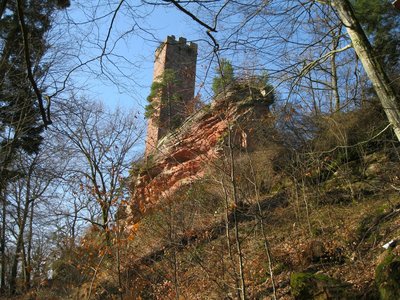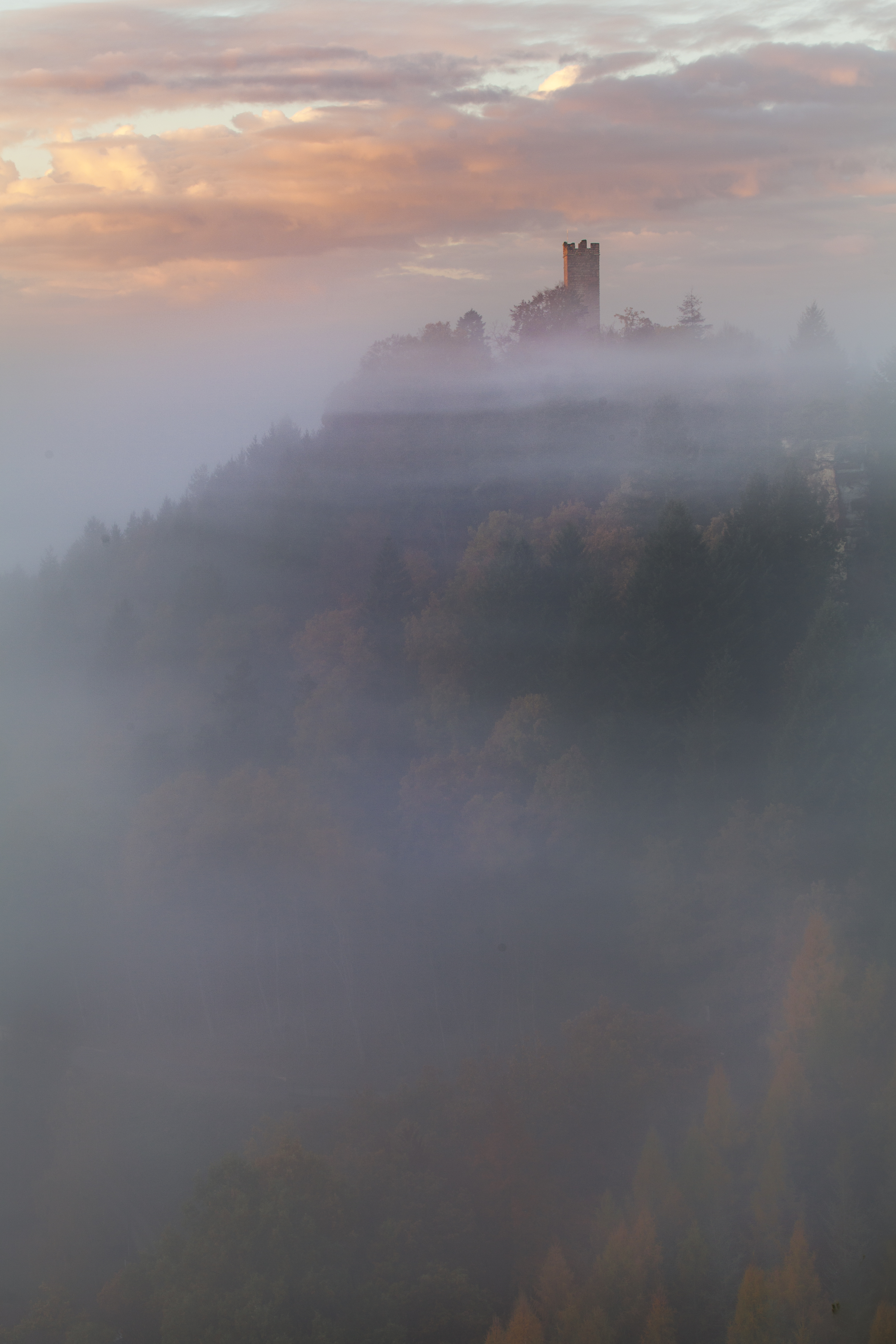
Waldeck circuit
Description
Leave the parking direction of the D162F, then follow the green ring markings.
Walk through the bog forest, cross the forest road and then the meadow to reach the hamlet of Waldeck, which was originally a farmhouse built below Waldeck Castle.
At the pass, climb the forest trail hairpin left to visit the castle Waldeck. Nice view from the platforms (be careful, the stairs are narrow and sometimes steep). Then go back in 2 and turn left then right towards Erbsenfelsen. At this last crossroads you can continue left to see Waldeck Pond.
After the rocky Erbsenfelsen and its arch, turn right towards the pond of Hanau. At the junction with the forest road of Hanau, a boundary marker stands next to a partially buried blockhouse. Continue straight on the Waldecker Hubel Forest Road and return to the car park.
- Departure : Parking at the Hanau pond
- Arrival : Parking at the Hanau pond
- Towns crossed : Philippsbourg and Éguelshardt
9 points of interest
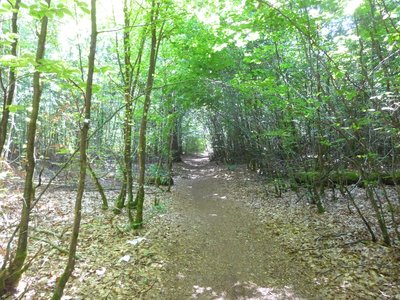
Dans la forêt de la tourbière - PNRVN - A.Serylo  Flora
FloraPeatland
This peat bog is part of the Natural Reserve of Rocks and Peatlands of Bitche. Peat bogs, which are original in Western Europe, are very fragile wetlands with remarkable flora such as sundew, small carnivorous plants or Sphagnum mosses that can absorb a large amount of water like a sponge. There are also many dragonflies and amphibians.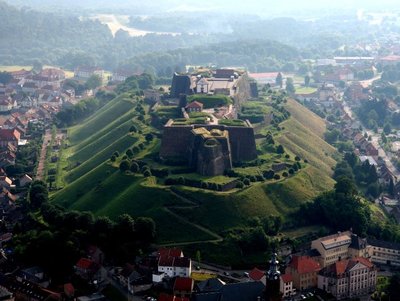
Citadelle de Bitche - SYCOPARC  Castle-church-abbey
Castle-church-abbeyCitadel of Bitche
The Citadel at Bitche
A true military master piece, the Citadel is the most important historical site in Pays de Bitche.
In the past, Pays de Bitche was the setting for many wars and invasions and of which the castle on the site of Bitche Citadel was a centrepiece. Neither the Swedish, the region of Lorraine, the French nor the Germans were able overthrow this stronghold.
In 1680, the castle was replaced by the Citadel designed by Vauban. It was dismantled in 1697, but rebuilt in 1740 by the architect Cormontaigne.
The most glorious feat was conducted by Commander Teyssier and his garrison during the 1870 Franco-Prussian war. While the rest of France was capitulated, they resisted for 230 days.
The visit
Equipped with headphones, the visit around the Citadel takes you through the underground passages allowing you to relive the resistance against the Germans (1870-1871).
On the platform of the Citadel, the historical museum “The Men during the 1870 War” has records and photos, and a collection of arms and uniforms worn by the men on the battlefield. The recently restored Vauban Chapel exposes an original relief map of Bitche dating to 1794 which is now classified as a Historical Monument.
The Citadel is one the “Great attractions in Moselle”. The sublime Garden for Peace is at the foot of its ramparts
NOTE: the tariff for the citadel no longer includes the entry fee into the gardens. With the entrée ticket you now receive a reduced rate into the gardens (2euros/pers).
Adresse :
Rue Bombelles par Rue des Tilleuls
57230 BITCHE
At the bend of the hills that encircle Bitche, the Citadel reveals its silhouette, monumental, even haunting. Redoubtable stone sentinel or mysterious ship arisen from a sea of mists, it seems in perpetual staging. Vauban and Cormontaigne were the most famous designers of this fortification work whose origins date back to the 12th century. If it has all the characteristics of 17th and 18th century military architecture, the Citadel can be proud of its peculiarities. Her story, she shares with the city that over the centuries has grown in the reassuring shadow of its powerful curtains. Perched on its rock of former strategic interest, the Citadel evokes a historical past, punctuated by both glorious and tragic episodes. His bowels contain the memory of those men who, under the uniform of their respective countries, have bravely defended them.
Contact :
03 87 96 18 82
Rue Bombelles by Rue des Tilleuls
57230
BITCHE
03 87 96 95 03E-mail :
citadelle.bitche@orange.frWebsite :
http://www.citadelle-bitche.com
http://www.citadelle-bitche.com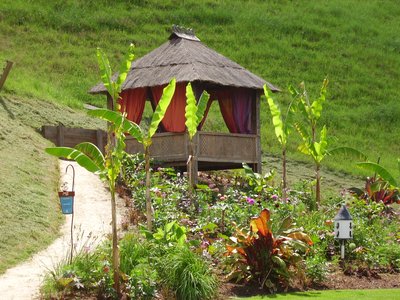
Jardin pour la Paix de Bitche - SYCOPARC  Flora
FloraGarden for the Peace of Bitche
This garden, created in 2003, wants to be the commitment of a commitment of the future. Over 500m, a succession of different open gardens, each with its own history and ambition, revolves around a belvedere promenade, thus forming a floral universe combining glass, crystal, rustic plants, wrought iron ... It is part of the extension of the Jardins en Troc festival.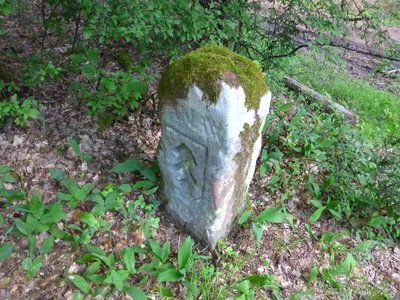
Borne frontière du 13e siècle - PNRVN - A.Serylo  Small patrimony
Small patrimony17th century boundary stone
A 17th century boundary marker marking the historical boundary between the ancient county of Hanau and the Duchy of Lorraine. Other similar posts are aligned along the forest road of Hanau or Bornes.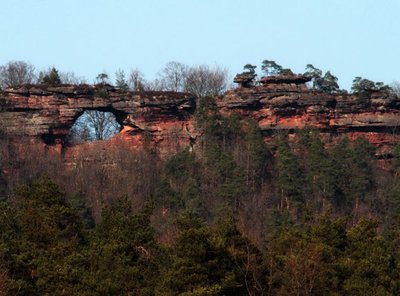
L'Erbsenfelsen, avec sa grande arche - http://vers-le-vent.blogspot.fr/  Geology
GeologyErbsenfelsen rocks
It is a sandstone wall with a strongly eroded base 25 to 30 meters high and almost 450 meters long, located on the Erbsenberg. Characterized by a large arch of 12 m wide and 8m high, it is a privileged site for the nesting of peregrine falcons and ravens.
WARNING: This site is protected! From February to early July, avoid approaching the rock to preserve the nesting peregrine falcon. Please respect the access restrictions if mentioned locally.

 Mountain pass
Mountain passGrand Dunkelthal Pass
Located in the north-east of the Moselle, it is the lowest pass of the forest roads with 291 m of altitude.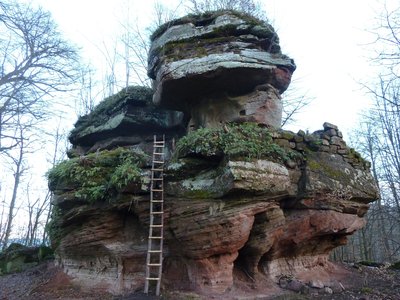
Château-fort de Rothenbourg - SYCOPARC  Castle-church-abbey
Castle-church-abbeyRothenburg Chateau
The castle dates back to the 9th century. It was part of the County of Bitche in 1353 before becoming a den for knight-robbers, which earned him to be ravaged by the Strasbourg militia. It is in ruins since the 16th century. In 1938, he was integrated into the passive defense system of the Maginot Line and was occupied by the troops until 1940, but did not know the fight.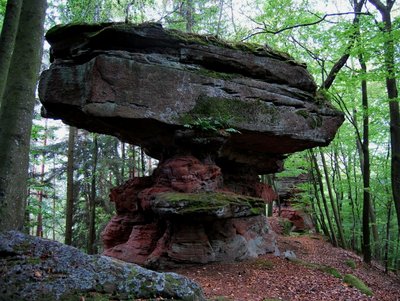
Guy Schnell - http://www.randoalsacevosges.com  Geology
GeologyRocher de l'Abrahamfels
Rock of the Abrahamfels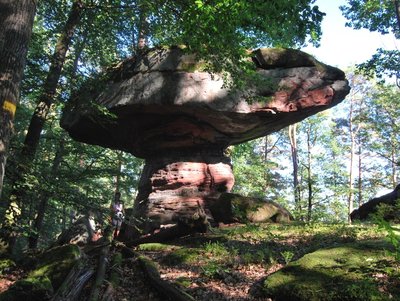
Guy Schnell - http://www.randoalsacevosges.com  Geology
GeologyRocher du Pilsfels
Rock Pilsfels
Forecast
Altimetric profile
Sensitive areas
- Impacted practices:
- Aerial, Aquatic, , Underground, Land, Vertical
- Sensitivity periods:
- JanFebMarAprMayJunJulAugSepOctNovDec
- Contact:
- Email : contact@parc-vosges-nord.fr Tél. : 03 88 01 49 59
- Impacted practices:
- Aerial, , Land, Vertical
- Sensitivity periods:
- JanFebMarAprMayJunJulAugSepOctNovDec
- Contact:
- Email : contact@parc-vosges-nord.fr Tél. : 03 88 01 49 59
Recommandations
Map IGN : 3713 ET
Be careful, from February to June, avoid approaching the Erbsenfelsen to preserve the nesting of the peregrine falcon. Please respect the access restrictions if mentioned locally.
Information desks
Tourist Office of the Pays de Bitche
2 avenue du Général De Gaulle, 57230 Bitche
Pays de Bitche Tourist Office - Baerenthal - Philippsbourg branch
1 rue du printemps d'Alsace, 57230 Baerenthal
Transport
- Train TER to Bannstein.
- Itineraries in Alsace: www.vialsace.eu
Access and parking
Parking :
Accessibility
- Emergency number :
- 114
Report a problem or an error
If you have found an error on this page or if you have noticed any problems during your hike, please report them to us here:


